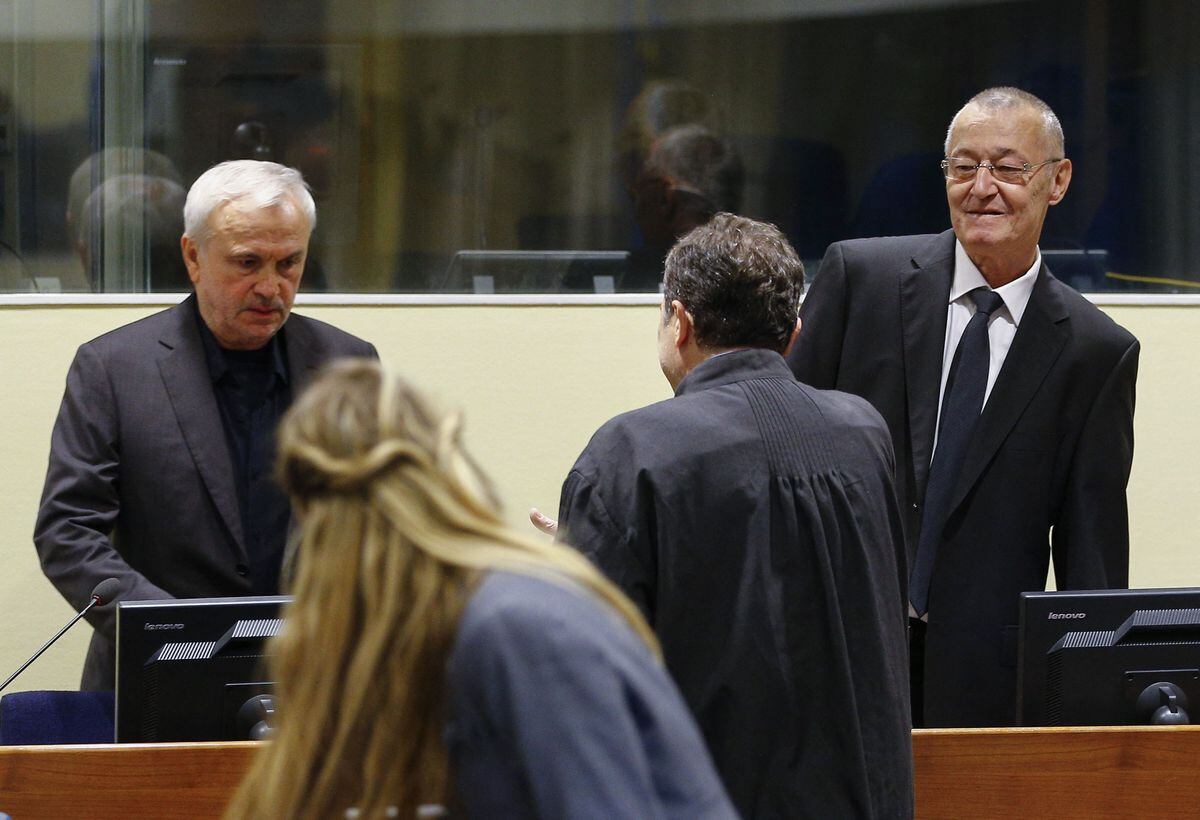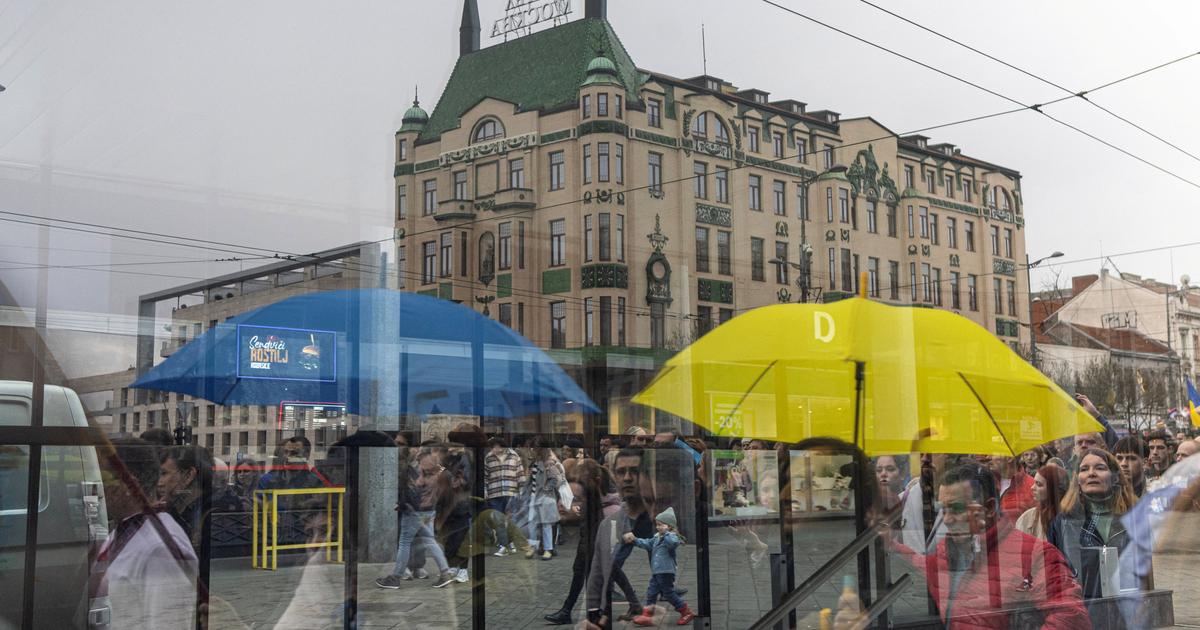The major trials for the Balkan wars have come to an end 30 years after the United Nations ordered the creation, in 1993, of the International Criminal Tribunal for the former Yugoslavia (ICTY). The court formally closed its doors in 2017, but there were still appeals and some minor cases, and on Thursday the appeal of the case against Jovica Stanisic and Franko Simatovic, Serbian spy chiefs with the late former president of the country Slobodan Milosevic, marked a milestone. It is the first time that the judges conclude that Serb officials were directly part of a criminal enterprise linked to the political and military power of Belgrade and that they acted at its orders in the regions that sought independence in the process of decomposition of Yugoslavia. In other cases tried by the court, judges concluded that the defendants were linked to Bosnian Serb or Croatian Serb leaders.
The two accused have been convicted of war crimes and crimes against humanity committed in Bosnia-Herzegovina and Croatia. The ruling not only imposes a 15-year prison sentence on each, it also confirms that the aim of their crimes was the ethnic cleansing of non-Serbs.
What happened to Stanisic and Simatovic shows the difficulties of proving beyond a shadow of a doubt Serbia's political and military collusion in the crimes perpetrated in Bosnia and Croatia. Both were acquitted at first instance in 2013 because they were deemed not to have planned and ordered the killings, deportation, beatings, illegal detentions, sexual abuse and forced labour committed between 1991 and 1995 by armed units in those regions which, however, they themselves organised and directed with Serbian state funds. In 2015, appeal judges ordered a retrial, arguing that the concept of complicity in a crime had not been misinterpreted. In 2021, a sentence of 12 years in prison was handed down for each. The current appeal increases the sentence to 15 years and closes the legal path of this case.
According to Nevenka Tromp Vrkic, of Croatian origin and investigator of the prosecution team during the trial against Milosevic – found dead in his cell in The Hague during the trial in 2006 – not even the sentences for the Srebrenica genocide, which meant life imprisonment for former Bosnian Serb general Ratko Mladic, and his political boss, Radovan Karadzic, "managed to establish the link with Belgrade." In a telephone conversation from Croatia, he also explains that the ruling of another court, the International Court of Justice of the United Nations (ICJ), "considered in 2007 that, although there was a genocide in Srebrenica (Bosnia, 1995) Serbia was not directly responsible or complicit in it, although it erred in not preventing it." "In other words, without the conviction of Stanisic and Simatovic, the ICTY would have ended its journey without a single conviction directly implicating the Serbian state administration. The fascination with evil generated by Mladic, Karadzic and Milosevic himself obscures the complex machinery of those who worked in the commission of the criminal plan for which Stanisic and Simatovic have been convicted."
For Serge Brammertz, prosecutor of the tribunals for the former Yugoslavia and Rwanda, this was also "the last opportunity to convict some subjects for their participation in a joint criminal enterprise where Belgrade was involved, whose broader objective was ethnic cleansing in territories of Bosnia-Herzegovina and Croatia," he says in a telephone conversation. He adds that "there has always been a political approach, both from Belgrade and from Zagreb, the Croatian capital, tending to say that they had nothing to do with it. That it was an internal armed conflict between Serbs, Croats and Bosniaks in Bosnia-Herzegovina." And he stresses that the direct link between Belgrade's leadership and the crimes investigated was already pointed out by the Prosecutor's Office from the beginning in the case against Milosevic.
Jovica Stanisic headed Serbian state security, and the prosecution has portrayed him as one of Milosevic's most loyal collaborators. Franko Simatovic, alias Franki, denied the existence of special troops within state security, but during the trial the link between secret services and paramilitary groups active in Serbian-controlled areas in Croatia and Bosnia was shown.
The final appeal has been in the hands of the so-called International Residual Mechanism for Criminal Tribunals, charged with concluding outstanding minor trials and appeals, which is now focusing on supporting the national jurisdictions of Bosnia and Croatia. There, there are hundreds of cases of alleged criminals from the same conflict, and its courts can take advantage of the ten million documents accumulated by the ICTY. It's the biggest challenge at the moment, and Brammertz admits he'd like to say they're doing well. "But it's not like that. There are still hundreds of perpetrators of crimes committed in Bosnia-Herzegovina who have taken refuge in Croatia or Serbia, and because they have those two nationalities they are not extradited to Bosnian territory. These trials are partially supported, but there is a pothole of impunity and a political dimension to all this."
Before Croatia joined the European Union, it was very active in regional cooperation. Currently, Bosnia-Herzegovina and Serbia aspire to join the EU, and that favors, according to the prosecutor, that they do their part to hold the guilty ones accountable. He adds, however, a disturbing fact: "We expected reconciliation to be the main objective so many years later, but we see that the glorification of war criminals in each of their communities prevails. On the other hand, denial of the Srebrenica genocide [perpetrated in 1995 by Bosnian Serb forces, who annihilated some 8,000 Bosnian Muslim males] is also frequent in some parts of the former Yugoslavia."
Tromp Vrkic acknowledges that the ICTY has done justice, "but if you look at who started the war and the responsibility, I don't think the sentences handed down fully reflect that." In his opinion, "Serbia lost the wars it declared, but it has not been treated as a loser. Despite this, public opinion seems to have the idea that the court focused on judging Serbs." To illustrate the problem of reconciliation, he recalled that Kosovo and Bosnia had ended up divided territorially and were States in difficulty because of it. "In the first, there is North Kosovo [an area inhabited mainly by Serbs trying to gain autonomy from the rest, of Albanian origin]. In Bosnia, we have the Republika Srpska [majority Serb population], one of the two political entities that make up the country, created by the Dayton Peace Accords of 1995. So the main victims argue that reconciliation is difficult under these conditions."
In its 30 years of existence, the ICTY has passed 161 accused, 90 sentences have been handed down (with 19 acquittals) and 4,650 witnesses have testified. Brammertz recalls that despite the years that have passed, there are still some cases of contempt and intimidation of witnesses, to be resolved by the same Residual Judicial Mechanism, but considers that the ICTY's message is clear: "International justice takes time, but it prevails. Look, if not, at the arrest of Fulgence Kayishema, one of the most wanted men for the genocide in Rwanda." On the run for 22 years, he was arrested on May 24 in South Africa. He is accused of having been directly involved in the massacre of the Nyange church, which was set on fire and then demolished, killing some 2,000 people sheltering inside.
For experts like Tromp Vrkic, the ICTY also leaves a legacy for the future related to the Ukraine case. The Office of the Prosecutor has always stressed the link between the crimes committed in the Balkan wars and the territorial aspirations of the Serbs. "There is a clear analogy between what Serbia did in Croatia and Bosnia-Herzegovina, and Russian President Vladimir Putin's invasion of its Ukrainian neighbors. Instead of saying that he intended to change Russia's borders, he has alluded to the rescue of 'its population' of Russian origin. The same thing Milosevic did in his day with the Serbs of the former Yugoslavia," he explains.
To do this, he adds, Putin promoted the entities of Lugansk and Donetsk, now illegally annexed, "which repeat the formation of the Republika Srpska (Bosnia) and the Republic of Krajina (Croatia, reintegrated in 1998)." In his opinion, if the Russian president ends up facing justice for the crime of aggression by invading Ukraine, "the work of the ICTY will show that political leaders can be prosecuted, although such a case should not take so long."
Follow all the international information on Facebook and Twitter, or in our weekly newsletter.
Subscribe to continue reading
Read without limits
Read more
I'm already a subscriber





/cloudfront-eu-central-1.images.arcpublishing.com/prisa/PLP56HQSNVG6LE2VXFHYGU3QXM.jpg)







